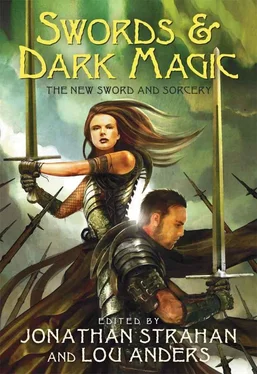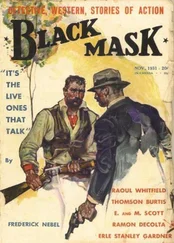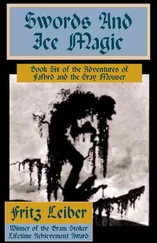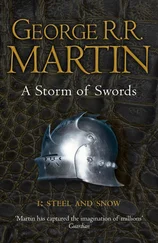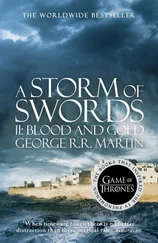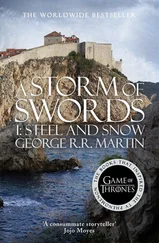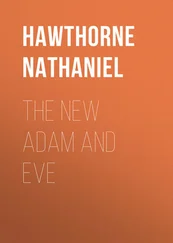No idea how long I stood and he sat. It occurred to me that I was just assuming he was a dead man. Looked at logically, far more likely that he was alive, and had reasons of his own for climbing up on a roof in the middle of the night. Well, there’s a time and a place for logic.
He turned his head, looking down the line of the roof-tree, and lifted his heels, and dug them into the turf three times: clump, clump, clump. (And that was when I realized the flaw in my earlier rationalization. Three clumps; always three, ever since I was a kid. How many three-legged sheep do you see?) At that moment, the moon came out from behind the clouds, and suddenly we were looking at each other, me and him.
My host had been right: he was purple, like a grape. Or a bruise; the whole body one enormous bruise. Swollen, he’d said; either that or he was an enormous man, arms and legs twice as thick as normal. His eyes were white; no pupils.
“Hello,” I said.
He leaned forward just a little and cupped his hand behind his left ear. “You’ll have to speak up,” he said.
Words from a dead man; a purple, swollen man sitting astride a roof. “Tell me,” I said, raising my voice. “Why do you do that?”
He looked at me, or a little bit past me. I couldn’t tell if his mouth moved, but there was a deep, gurgling noise that could only have been laughter. “Do what?”
“Ride on the roof like it’s a horse,” I said.
His shoulders lifted; a slow, exaggerated shrug, like he didn’t know what a shrug was but was copying one he’d seen many years ago. “I’m not sure,” he said. “I feel the urge to do it, so I do it.”
Well, I thought. One of the great abiding mysteries of my childhood not quite cleared up. “Are you Anthemius?” I asked. “The schoolmaster?”
Again the laugh. “That’s a very good question,” he said. “Tell you what,” he went on, “come up here and sit with me, so we can talk without yelling.”
In the moonlight, I could make out the huge hands, with their monstrous overripe fingers. How tight the skin would have to be, with all that pressure against it from the inside. Breaking a neck would be like snapping a pear off a tree.
“Let me rephrase that,” I said. “Were you Anthemius? When you were—”
“Yes,” he said, speaking quickly to cut off a word he didn’t want to hear. “I think I was. Thank you,” he added. “I’ve been trying to remember. It’s been on the tip of my tongue, but somehow I can’t seem to think of any names.”
The approved procedure for coping with the restless dead is, essentially, what Grandfather did; though of course we make rather more of a fuss about it. The approved procedure should, needless to say, be carried out in daylight; noon is recommended. Should you chance to encounter a specimen during the night, there are two courses of action, both recommended rather than approved. One, you draw your sword and cut its head off. Two, you challenge it to the riddle game and keep it talking all night, until dawn comes up unexpectedly and strands it like a beached whale in the cruel light.
Commentary on that. I am not a man of action. I don’t vault onto roofs, I don’t carry weapons. One of the reasons I left the farm in the first place was I have trouble lifting even moderate loads. So much for option one; and as for option two—
Also, I was curious. Interested.
“What happened to you?” I said.
“You know, I’m really not sure,” he replied; and the voice was starting to sound like a man’s voice, my ears were getting the hang of it, the way my eyes had got used to the dark. “I know I was out in the snow and I’d lost my way. I got terribly cold, so that every bit of me hurt. Then the pain started to ease up, and I sort of fell asleep.”
“You died,” I said.
He didn’t like me saying that, but I guess he forgave me. “I remember waking up,” he said, “and it was pitch dark and terribly quiet, and I couldn’t move. I was very scared. And then it occurred to me, I wasn’t breathing. I don’t mean I was holding my breath. I wasn’t breathing at all, and it didn’t matter. So then I knew.”
I waited, but I hadn’t got all night. “And then?”
He turned his head away. No hair, just a bulging purple scalp. A head like a plum. “I was terrified,” he said. “I mean, I had no way of knowing.” He paused, and I have no idea what was passing through his mind. “After a long time, I found I could move after all. I got my hands up against the lid, and I pushed, and I could feel the wood burst apart. That scared me even more, I thought the roof, I mean all the earth on top of me, I thought it’d cave in and bury me.” He paused again. “I was always frightened of tight places,” he said. “You know.”
I nodded. Me too, as it happens.
“I guess I panicked,” he went on, “because I kept pushing, and I somehow knew that I was incredibly strong, much stronger than I’d ever been before, so I thought, if I push hard enough. I wasn’t thinking straight, of course.”
“And then?” I asked.
“Pushed right up through the dirt and into the moonlight,” he said. “Amazing feeling. The first thing I wanted to do was run to the nearest farm and tell them, look, I’m not dead after all.” He stopped; he’d said the word without thinking. “But then I thought about it; and I still wasn’t breathing, and I couldn’t actually feel anything. I could move my hands and feet, I could stand upright and balance, all that, but—you know when you’ve been sitting a long time and your feet go numb. It was like that, all over. It felt so strange.”
“Go on,” I said.
He didn’t, not for a long time. “I think I sat down,” he said. “I don’t know why I’d have done that; standing up didn’t make me tired or anything. I don’t feel tired, ever. But I was so confused, I didn’t know what I was supposed to do. It all felt wrong.” He lifted his heels slowly and let them drop; clump, clump, clump. “And while I was there the sun started to come up, and the light just sort of flooded into my head and bleached everything away, so I couldn’t think at all. I guess you could say I passed out. Anyway, when I opened my eyes I was back where I’d started from, lying in the dark.”
I frowned. “How did you get back there?”
“I just don’t know,” he said. “Still don’t. It always happens, that’s all I know. When the sun comes up, my mind washes away. If I’ve gone any distance, I know I have to get back. I run. I can run really fast. I know I’ve got to be back—home,” he said, with a sort of breaking-up laugh, “before the sun comes up. I’ve learned to be careful, to give myself plenty of time.”
He was still and quiet for a while. I asked, “Why do you kill things?”
“No idea.” He sounded distressed. “If something comes close enough, I grab it and twist it till it’s dead. Like a cat lashing out at a bit of string. Reflex. I just know it’s something I have to do.”
I nodded. “Do you go looking—?”
“Yes.” He mumbled the word, like a kid admitting a crime. “Yes, I do. I do my best to keep away from where there might be people. It’s all the same to me: sheep, foxes, men. I’d go a long way away, into the mountains, if I could. But I have to stay close, so I can get back in time.”
I’d been debating with myself, and I knew I had to ask. “What were you?” I said. “What did you do?”
He didn’t answer. I repeated the question.
“Like you said,” he replied. “I was a schoolteacher.”
“Before that.”
When he answered, it was against his will. The words came out slow, flat; he spoke because he had to. “I was a Brother,” he said. “When I was thirty, they said I should apply to the Order, they thought I had the gift, and the brains, and the application and the self-discipline. I passed the exam and I was at the Studium for five years. Like you,” he added.
Читать дальше
